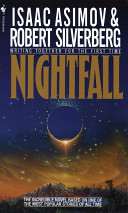Hypothesizing on a World Without Stars
'Well, then, supposing there were other suns in the universe.' He broke off a little bashfully. 'I mean suns that are so far away that they're too dim to see. It sounds as if I've been reading some of that fantastic fiction, I suppose.'
'Not necessarily. Still, isn't that possibility eliminated by the fact that, according to the Law of Gravitation, they would make themselves evident by their attractive forces?'
'Not if they were far enough off,' rejoined Beenay, 'really far off -- maybe as much as four light years, or even more. We'd never be able to detect perturbations then, because they'd be too small. Say that there were a lot of suns that far off; a dozen or two, maybe.'
Theremon whistled melodiously. 'What an idea for a good Sunday supplement article. Two dozen suns in a universe eight light years across. Wow! That would shrink our world into insignificance. The readers would eat it up.'
'Only an idea,' said Beenay with a grin, 'but you see the point. During an eclipse, these dozen suns would become visible because there'd be no real sunlight to drown them out. Since they're so far off, they'd appear small, like so many little marbles. Of course the Cultists talk of millions of Stars, but that's probably exaggeration. There just isn't any place in the universe you could put a million suns -- unless they touch one another.'
Sheerin had listened with gradually increasing interest. 'You've hit something there, Beenay. And exaggeration is just exactly what would happen. Our minds, as you probably know, can't grasp directly any number higher than five; above that there is only the concept of "many". A dozen would become a million just like that. A damn good idea!'
'And I've got another cute little notion,' Beenay said. 'Have you ever thought what a simple problem gravitation would be if only you had a sufficiently simple system? Supposing you had a universe in which there was a planet with only one sun. The planet would travel in a perfect ellipse and the exact nature of the gravitational force would be so evident it could be accepted as an axiom. Astronomers on such a world would start off with gravity probably before they even invented the telescope. Naked-eye observation would be enough.'
'But would such a system be dynamically stable?' questioned Sheerin doubtfully.
'Sure! They call it the "one-and-one" case. It's been worked out mathematically, but it's the philosophical implications that interest me.'
'It's nice to think about,' admitted Sheerin, 'as a pretty abstraction -- like a perfect gas, or absolute zero.'
'Of course,' continued Beenay, 'there's the catch that life would be impossible on such a planet. It wouldn't get enough heat and light, and if it rotated there would be total Darkness half of each day. You couldn't expect life -- which is fundamentally dependent upon light -- to develop under those conditions. Besides -- '
Notes:
Asimov's world with so many suns there is no night is a place where people hypothesize other configurations of worlds they cannot see and do not believe exist.
Folksonomies: speculation science fiction hypothesis
Taxonomies:
/technology and computing/consumer electronics/camera and photo equipment/telescopes (0.553100)
/family and parenting/children (0.546522)
/law, govt and politics (0.540885)
Keywords:
suns (0.999688 (negative:-0.483565)), dozen suns (0.960215 (negative:-0.481608)), mean suns (0.827232 (negative:-0.433763)), damn good idea (0.813780 (positive:0.423764)), cute little notion (0.795045 (negative:-0.355136)), simple problem gravitation (0.792977 (neutral:0.000000)), total Darkness half (0.778854 (negative:-0.233472)), Beenay (0.641374 (positive:0.214281)), Stars Asimov (0.625444 (negative:-0.535324)), attractive forces (0.616497 (positive:0.507826)), Cultists talk (0.604337 (neutral:0.000000)), supplement article (0.603696 (positive:0.298117)), good Sunday (0.592020 (positive:0.621249)), little marbles (0.590971 (negative:-0.635665)), perfect ellipse (0.581956 (positive:0.520807)), gravitational force (0.572349 (positive:0.278978)), exact nature (0.572267 (positive:0.278978)), pretty abstraction (0.571008 (positive:0.593005)), philosophical implications (0.566967 (negative:-0.255527)), Sheerin (0.556793 (positive:0.203289)), absolute zero (0.555590 (negative:-0.271966)), perfect gas (0.552650 (positive:0.460167)), exaggeration (0.476222 (negative:-0.350468)), universe (0.462793 (positive:0.260723)), world (0.460277 (negative:-0.115201)), planet (0.460023 (positive:0.077685)), place (0.423538 (negative:-0.553179)), course (0.408959 (positive:0.261007)), life (0.398214 (positive:0.259953)), dim (0.379455 (neutral:0.000000))
Entities:
Beenay:Person (0.803961 (positive:0.214281)), suns:Organization (0.741324 (neutral:0.000000)), Sheerin:Person (0.642425 (positive:0.203289)), Stars Asimov:Person (0.463237 (negative:-0.548104)), Law of Gravitation:Organization (0.424148 (positive:0.226611)), Theremon:Person (0.331536 (negative:-0.572360)), eight light years:Quantity (0.331536 (neutral:0.000000)), one:Quantity (0.331536 (neutral:0.000000))
Concepts:
Gravitation (0.960673): website | dbpedia | freebase
General relativity (0.875339): dbpedia | freebase | opencyc
Universe (0.845069): dbpedia | freebase
Earth (0.752184): dbpedia | freebase
Idea (0.639593): dbpedia | freebase | opencyc
Thought (0.635994): dbpedia | freebase | opencyc
Planet (0.593803): dbpedia | freebase | opencyc
Concept (0.592559): dbpedia | freebase | opencyc

Triples
 On Rarely Seeing the Stars
On Rarely Seeing the Stars
If the Stars Only Came Out One Night in 1,000 Years > Emphasis > Hypothesizing on a World Without StarsIsaac Asimov expands in a short story on an Emerson quote about seeing the stars only once in a great while.
 Taking the Stars for Granted
Taking the Stars for Granted
If We Only Saw the Stars One Night Every 100 Years > Contrast > Hypothesizing on a World Without StarsAsimov and Carson speculate on worlds where they cannot see the stars.




